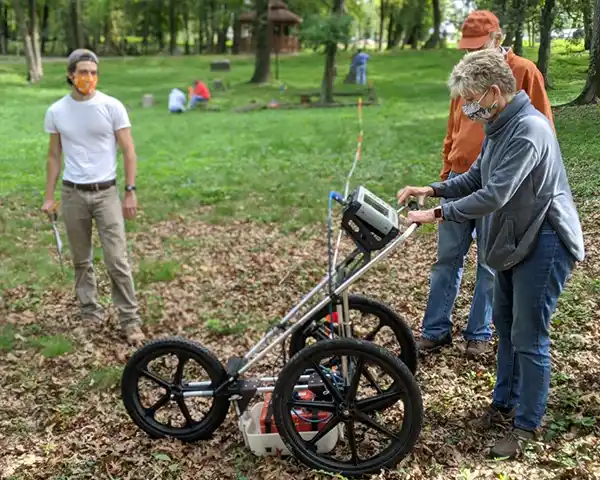In the Carrels
Graduate Student Spotlights

Over the past year, graduate students in the anthropology department have pushed forward to conduct research, engage with fellow students, and collaborate with community partners while dealing with the continuing challenges of the COVID-19 pandemic. As in-person learning and professionalization resumed this fall, some aspects of graduate life have settled into a new kind of normal. Students resumed data collection and fieldwork that had been halted in early 2020 with added precautions of vaccinations, masks, and testing measures in place. They are once again presenting their work at conferences while also engaging in the “new normal” of virtual talks. Departmental social events that had been halted at the beginning of the pandemic have likewise resumed with cautions in place, including celebrations of the start of term and degree milestones. Congratulations to recent graduates Angela Mallard (PhD) and Sadie Counts, Matt Davis, Brigid Ogden, Sarah Schwing, Thomas Tran and Mary Ruth Wossum-Fisher (MA).
Ongoing graduate student research has included international fieldwork along with a wide range of US-based research. Jenna Watson, a PhD candidate, began a nine-month Fulbright research grant at the Francis I. Rainer Institute of Anthropology of the Romanian Academy in Bucharest, Romania. Her research focuses on skeletal stress, diet, and migration in human skeletal remains from three cemetery sites in northeastern Romania dating to the Late Medieval-Early Modern period (14th – 18th centuries CE), and is also supported by a McClure Scholarship for International Travel.
Graduate student Tatianna Griffin has been collaborating with community partners at the Good Citizens Cemetery, Knoxville’s oldest Black cemetery, while other graduate students and faculty have continued headstone and ground penetrating radar (GPR) documentation efforts at the Odd Fellows Cemetery, another important historically Black cemetery in Knoxville. Students in Kandi Hollenbach’s Public Heritage and Community Archaeology course spent fall semester conducting research at the Stonecipher–Kelly House at Frozen Head State Park, working with Tennessee State Parks staff to collect information that will help interpret the site to the public.
The Anthropology Graduate Student Association (AGSA) continues to advocate for graduate student needs both within the department and the broader graduate student community. For the past two years, AGSA has been operating a food pantry for undergraduate and graduate students in the anthropology department, providing instant meals, toiletries, pantry staples, snacks, and other items with no questions asked. The pantry is restocked monthly with funds from AGSA and the Undergraduate Anthropology Association (UAA), along with individual donations. This year, demand has skyrocketed due to the resumption of in-person learning. AGSA representatives also have been part of ongoing Graduate Student Senate efforts to increase teaching assistant and associate stipends to provide all graduate students with a living wage and to increase the availability of mental health services in the university health system. AGSA members have also volunteered their time by teaching community outreach courses to increase funding reserves that help offset student fees.
Graduate students are looking forward to continuing their research, teaching, outreach, and advocacy in the spring and summer, building on the successes and rising to the challenges that this year has brought.